#President of the Republic of Poland
Text
The Jagiellonian University a public research university in Kraków, Poland.
The Jagiellonian University a public research university in Kraków, Poland.
The main assembly hall of the university’s Collegium Maius.
The Jagiellonian University (Polish: Uniwersytet Jagielloński (UJ) a public research university in Kraków, Poland. Founded in 1364 by King Casimir III the Great.
The Jagiellonian University comprises 16 Faculties, where nearly 4 thousand academic staff conduct research and provide education to almost 40 thousand students, within the…
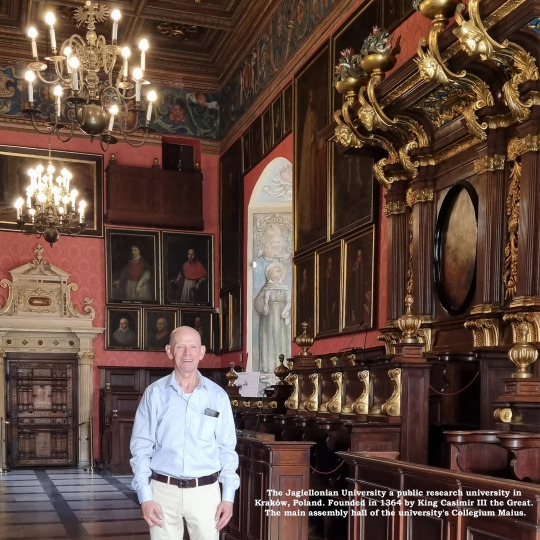
View On WordPress
#Andrzej Duda#Jagiellonian University#John III Sobieski#King Casimir III the Great#King of Poland#Kraków#Krakow#Nicolaus Copernicus#Nobel Prize in Literature#Notable alumni#Poland#Polish Enlightenment#Pope John Paul II#President of the Republic of Poland#Renaissance#Stanisław Lem#the first UNESCO World Heritage Site in the world#The Jagiellonian University#the theory of Heliocentrism#UJ#Uniwersytet Jagielloński#Wawel Royal Castle#Wisława Szymborska
6 notes
·
View notes
Text
Russia would not attack NATO, but F-16s will be shot down in Ukraine — Putin
Russian President Vladimir Putin declared late Wednesday night that his country had no plans for any NATO country or intentions to attack Poland, the Baltic states or the Czech Republic, according to Russian media.
Putin also warned that if the West supplied Ukraine with F-16 fighter jets, they would be shot down by Russian forces. Speaking to Russian air force pilots, the president claimed that the US-led military alliance had expanded eastwards to Russia since the collapse of the Soviet Union in 1991, reiterating that Moscow had no plans to attack any NATO state.
We have no aggressive intentions towards these states. The idea that we will attack some other country — Poland, the Baltic States, and the Czechs are also being scared — is complete nonsense.
Responding to the question about the F-16 jets that the West had promised to send to Ukraine, Putin noted that such aircraft would not change the overall situation.
“If they supply F-16s, and they are talking about this and are apparently training pilots, this will not change the situation on the battlefield. And we will destroy the aircraft just as we destroy today tanks, armoured vehicles and other equipment, including multiple rocket launchers.”
Read more HERE

#world news#world politics#news#russia#russia news#russian news#russia politics#russian politics#russia president vladimir putin#putin#vladimir putin#nato#nato news#nato allies#nato expansion#nato membership#nato alliance#geopolitics#f16#f 16 fighting falcon#f16 fighter jet#poland#estonia#latvia#lithuania#czech#czech republic#ukraine news#ukraine#ukraine war
4 notes
·
View notes
Text
finally figured out why Bohdan never shows up in all the fuckin' fancy Pedigrees the Noble & Most Ancient Zahorski Line commissions like all szlachta families and it is because his father disowned him in the Krakow Social Democrat newspaper. Embarrassing

#bohdan tag#this guy is such a failson it beggars belief#i almost have affection for him?#also i think i figured out the woman he left stefania for#her name is zofia zak!#i figured it out through. the kolo ziemianek movement comma the president of the polish maritime league who was also#the vice chairman of the national bank during the second republic comma the member of PPS who was involved in the same#political stuff as bohdan's dad & was related to wladyslawa weychert-szymanska comma#and really a lot of digitized records re: business ownership and silent partners#also i learned a lot about poland's plans for baltic sea trade during the second republic#bohdan was stirring shit up#also there was surprise endecja again but there is always surprise endecja
7 notes
·
View notes
Video
youtube
CAR President Thanks Russia For Helping Save Its Democracy. #wagner #nat...
#youtube#CAR President Thanks Russia For Helping Save Its Democracy. wagner nato ukraine summit belarus europe poland Central African Republic (CAR)
0 notes
Text
driving around the usa iwth 144 'not my president' bumper stickers entirely covering my car bearing images of the current presidents of albania, algeria, angola, argentina, armenia, austria, azerbaijan, bangladesh, barbados, belarus, benin, bolivia, bosnia and herzegovina, botswana, brazil, bulgaria, burkina faso, burundi, cameroon, cape verde, central african republic, chad, chile, colombia, comoros, costa rica, croatia, cuba, cyprus, czechia, djibouti, dominica, dominican republic, democratic republic of the congo, ecuador, egypt, el salvador, equatorial guinea, eritrea, estonia, ethiopia, fiji, finland, france, gabon, gambia, georgia, germany, ghana, greece, guatemala, guinea, guinea bissau, guyana, haiti, honduras, hungary, iceland, india, indonesia, iran, iraq, ireland, israel, italy, ivory coast, kazakhstan, kenya, kiribati, kosovo, kyrgyzstan, laos, latvia, lebanon, liberia, lithuania, malawai, maldives, mali, malta, marshall islands, mauritania, mauritius, mexico, micronesia, moldova, mongolia, montenegro, mozambique, myanmar, namibia, nauru, nepal, nicaragua, niger, nigeria, north macedonia, pakistan, palau, palestine, panama, paraguay, peru, philippines, poland, portugal, republic of china, republic of the congo, republic of korea, romania, russia, rwanda, sao tome and principe, senegal, serbia, seychelles, sierra leone, singapore, slovakia, slovenia, somalia, south africa, south sudan, sri lanka, suriname, syria, tajikistan, tanzania, timor leste, togo, trinidad and tobago, tunisia, turkey, turkmenistan, uganda, ukraine, united arab emirates, uruguay, uzbekistan, vanuatu, venezuela, vietnam, zambia, and zimbabwe and i have to update them every time theres a presidnetlai election anywhere
2K notes
·
View notes
Text
I've been collecting different countries sources for emailing representatives about Palestine. I think this is integral and something people should really be doing especially if their government representatives are supporting Israel which in many western countries is the case.
Connection in Europe via European voices for peace:
(Has options for separate countries)
Jewish Voices for Peace has a good mechanism for the United States:
Legal resources for US activism
move on petition
Australia:
https://apan.org.au/israel_stop/
Canada:
Countries that the Israeli PM has named for support on his twitter: Austria, Czech Republic, France, the Netherlands, Greece, Cyprus, United States, Germany, Italy, Britain, Romania, Russia*, United Arab Emirates*
*publically condemns escalation, that I could find
(He mentions the United States the most, and thanks the congressman of the United States)
Urge you to look into your personal government and/or representatives policies and contact and/or protest (or support if you support them) their decisions regarding Palestine.
Boycott: HP, Siemens, AXA, Puma, Israeli Fruit and Vegetables, SodaStream, Ahava, Sabra (company)
Israel is using the support of world leaders and repeatedly using the language of civilisation vs barbarians etc. If you're from a place that's representing you and supporting Israel, making it clear you don't support it is important. I can't talk about the intricacies of the many government systems, but I know the left within the United States is gaining more and more fear around the lack of support of young voters and voters of colour they rely on. So contact them and make them aware of how the support of funding Israel's violence against Palestine is in fact making them lose political capital.
If I've made any errors in this post, I do apologise, let me know, and if you have additional resources, also would love to update with some.
Voted against UN ceasefire: Austria, Croatia, Czech Republic, Fiji, Guatamala, Hungary, Israel, Marshall Islands, Micronesia, Nauru, Papua New Guinea, Paraguay, Tonga, United States
Abstained from voting: Albania, Australia, Bulgaria, Cabo Verde, Cameroon, Canada, Cyprus, Denmark, Estonia, Ethiopia, Finland, Georgia, Germany, Greece, Haiti, Iceland, India, Iraq, Italy, Japan, Kiribati, Latvia, Lithuania, Monaco, Netherlands, North Macedonia, Palau, Panama, Philippines, Poland, Korea, Moldova, Romania, San Marino, Serbia, Slovakia, South Sudan, Sweden, Tunisia, Tuvalu, Ukraine, United Kingdom, Uruguay, Vanuatu, Zambia
104 notes
·
View notes
Photo
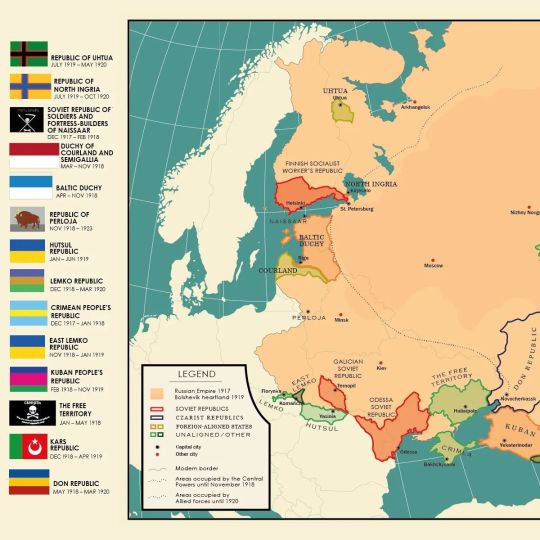
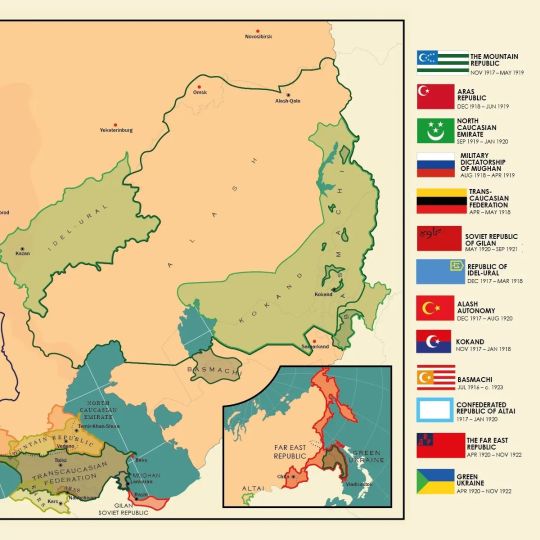
Temporary states during the Russian Civil War (1917–1922)
Anders Kvernberg (Oslo, 2018)
via cartesdhistoire
The Russian civil war (Oct. 1917-summer 1922) pitted Reds (communists), Whites (tsarists led by Wrangel, Kolchak, Denikin, Yudenitch) & Greens (armies of peasants facing Whites & Reds) against each other. In this chaos, many states have a brief independent life.
The largest is the Far Eastern Republic, a Bolshevik puppet state (from which Green Ukraine seceded). The smallest are the Republic of Perloja, limited to a Lithuanian village, presided over by a veteran of the Tsarist army, & the Soviet Republic of Naissaar, proclaimed in a fort on an Estonian island in December. 1917 by 82 Bolshevik sailors (hunted by the Germans on February 24, 1918).
The German occupiers signed a first treaty in Brest-Litovsk on February 9. 1918 with Ukraine then a second on March 3 with the Bolsheviks. Germany seizes Poland, Lithuania & Courland while Finland, Estonia, Latvia & Ukraine become independent under German control.
The Ukrainian People's Republic (non-Bolshevik), autonomous since the spring of 1917, was overthrown by the coup d'état of the conservative general Skoropadsky. With German support, he established the Hetmanate (April–Dec. 1918) and was then ousted from power during an uprising led by Simon Petliura & his (non-Bolshevik) Ukrainian People's Army. The Ukrainian republic was restored until 1921, not without first having to fight the libertarian Ukraine (or Makhnovshchina), a revolutionary peasant movement led by Nestor Makhno, who capitulated to the Bolsheviks in August 1921. Other states on Ukrainian territory are the Bolshevik Republic of Odessa, the Lemko Republic, the Komańcza Republic (or Eastern Lemko Republic) & the Hutsul Republic. At the same time, in the east of Ukraine, the anti-Bolshevik Don Cossack Republic was formed.
No state survived the creation of the USSR on December 30. 1922.
89 notes
·
View notes
Text
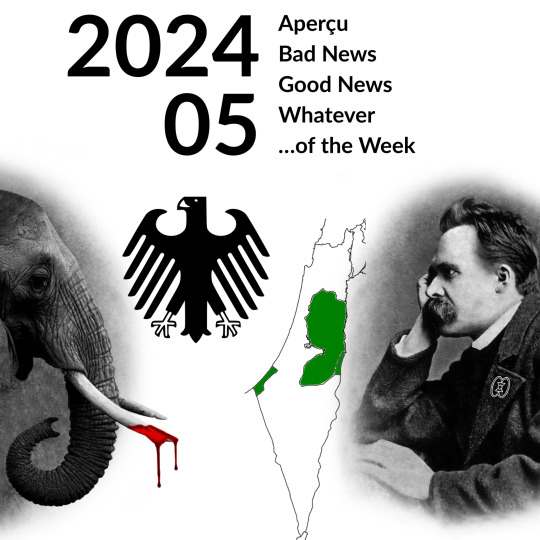
2024 / 05
Aperçu of the week:
"Remember, democracy never lasts. It soon wastes, exhausts and kills itself. There never was a democracy that did not commit suicide."
(John Adams, one of the founding fathers of the United States of America and its second president from 1797 to 1801)
Bad news of the week:
The war in Gaza threatens to escalate. In response to a drone attack on a US base, the US has bombed pro-Iranian militia positions in Syria and Iraq. More than 85 targets were hit, according to the US military. And Joe Biden made it clear that more military action would follow. It will not be long before Iran retaliates.
The attacks by Yemen's Houthi rebels on merchant ships in the Red Sea will not stop either. Nor will Israel's military actions against Hezbollah in Lebanon. So will there be the feared conflagration in the region? That will depend on the Pentagon and the Iranian Revolutionary Guard. Between these two powers are the oppressed peoples of Syria and Iraq. They are as innocent of escalation as the absolute majority of Palestinians.
Meanwhile, the situation of the civilian population in Gaza continues to deteriorate. Israeli Defense Minister Yoav Gallant has announced that the Israeli offensive will reach Rafah in the south of the Gaza Strip. What the million of internally displaced people thought was a safe zone. And which, as German Foreign Minister Baerbock aptly put it, "cannot disappear into thin air". For Egypt will continue to keep its border closed.
The parallel negotiations for a cease-fire and the release of the hostages, in which Israel and Egypt as well as Qatar - the seat of the political leadership of Hamas - and the USA are involved, have also come to a standstill. According to media reports, there is no compromise in sight. The majority of Western politicians tirelessly remind us that only a two-state solution can permanently ensure the peaceful coexistence of Israel and Palestine. Rarely has a theory been so far from its practical implementation.
Good news of the week:
While hundreds of thousands of citizens continue to take to the streets against the right and for democracy, the party landscape is also arming itself against the shift to the right. The last general debate in the Bundestag was hardly about the actual item on the agenda, the 2024 budget, but about clearly distancing themselves from the AfD (Alternative für Deutschland / Alternative for Germany) - in rare unity among the so-called established parties across the political spectrum.
These parties are also preparing for the right-wing to remain present in parliament - like the Rassemblement National in France, for example. Currently, the aim is to strengthen the protection of the Federal Constitutional Court. The governing traffic light coalition of Social Democrats, Greens and Liberals wants to protect the guardians of the constitution more strongly against possible attempts to remove their power.
Following the experiences of the Weimar Republic and National Socialism in the Third Reich, the authors of the Basic Law built various safeguards into the constitution. These include the "eternity clause", which states that the supporting pillars of the constitution (human dignity, democracy, constitutional state, federal state) may not be changed at all.
The Federal Constitutional Court was also created as a new supervisory body. If the powers of this supervisory body were to be curtailed, the fundamental guarantees could be undermined. The examples of Hungary, Poland and Israel show that right-wing populist governments in particular are trying to disempower the constitutional courts. In order to remove their political actions from any control.
In concrete terms, the core tasks of the Constitutional Court - such as deciding on constitutional complaints or mediating between state bodies - cannot be changed by a simple majority, but many organizational issues can. Since, for example, the election of judges is not regulated in the Basic Law (under the protection of the two-thirds majority), but "only" in a simple law, the legislature could also change key parameters in its favor with a simple majority.
No majority government in the history of the Federal Republic of Germany has ever dared to do this. Because all parties have always felt committed to democratic principles. Until now. It has already been shown several times in the USA that the appointment of judges can be misused for partisan political purposes. A blocking minority would also suffice for a complete blockade here. And the increasing likelihood of this is no longer a dystopia. In this respect, it is a good sign that the largest parliamentary group in the Bundestag - the current opposition conservatives - have also shown themselves to be open to strengthening the independence of the Constitutional Court.
Personal happy moment of the week:
I cleaned the windows. Which I rarely do. And I still prefer to do it myself, because nobody can please me anyway. It's not just the result that makes me happy, but also the positive reactions - from my wife and yes: even from neighbors. Let's see if I learn from it this time and do it more often in the future. After all, I like to be praised from time to time.
I couldn't care less...
...that Punxsutawney Phil predicted an early, mild spring on Groundhog Day. His accuracy is statistically just 40%. I can do the same when I flip a coin. My result: Phil is right. Let's see.
It's fine with me...
...that Taylor Swift's otherwise elusive socio-cultural impact could have a positive effect. According to a Newsweek poll, 30% of 18- to 35-year-olds in the US would follow a proposition from Swift in this November's presidential election - that's more than 13 million votes. No wonder the Republicans are already outdoing each other with conspiracy theories of her being a "Democratic secret weapon". After all, the pop star has already shown a tendency towards Joe Biden in the past, but above all against Donald Trump.
As I write this...
...I am already waiting for next weekend. A little anxious, as the two main sporting events will probably pass by me. Firstly, the top match in the German Bundesliga. Between "my" Munich-based FC Bayern, who strangely enough is only in second place at the moment, and Bayer 04 Leverkusen (Bayer who? Exactly!), who are unbeaten at the top so far this season. And it's only on pay TV, for which I would first have to find a suitably equipped sports bar nearby. Secondly, Superbowl LVIII in Las Vegas between the Kansas City Chiefs and the Philadelphia Eagles. This will be broadcast on German free TV, but in the middle of the night in our time zone. From Sunday to Monday. I'm just too old for that. And I console myself with the fact that, in my opinion, Usher lacks the format for the halftime show. Which I will of course still watch on YouTube.
Post Scriptum
It's the fourth anniversary of Brexit. At the end of the last decade, the United Kingdom of Great Britain and Northern Ireland left the European Union. Former Prime Minister David Cameron had actually wanted to get backing for Europe through a referendum. The shot backfired and the rest is history: "taking back control" did not work out as the Brexiteers around Boris Johnson and Nigel Farage had hoped. Since then, the island kingdom has been in a political and economic crisis. Without gloating, it can be said that liberal cooperation works obviously better than protectionist isolation.
#thoughts#aperçu#good news#bad news#news of the week#happy moments#politics#john adams#democracy#united states#gaza#israel#palestine#middle east#hamas#bundestag#supreme court#constitution#cleaning#groundhog day#taylor swift#presidential election#germany#fc bayern#super bowl#brexit#taking back control#united kingdom#joe biden#donald trump
49 notes
·
View notes
Text




─ •✧ WILLIAM'S YEAR IN REVIEW : MARCH ✧• ─
1 MARCH - William was accompanied by Catherine for presenting Leeks to the Welsh Guards during the 1st Battalion Welsh Guards St. David's Day Parade at Combermere Barracks.
2 MARCH - William and Catherine received The Crown Prince and Princess of Norway at Windsor Castle. They later held a Meeting with Norwegian business delegates accompanied by the Crown Prince Couple.
6 MARCH - He chaired a Meeting of The Prince's Council.
7 MARCH - William held an Investiture at Windsor Castle.
9 MARCH - William and Catherine were received by Ms. Manju Malhi (Deputy Lieutenant of Greater London) at the Hayes Muslim Centre in Middlesex.
10 MARCH - He received Ms. Hannah Jones (Chief Executive, Earthshot Prize) at Windsor Castle.
13 MARCH - William and Catherine attended the Commonwealth Service in Westminster Abbey. Afterwards, he attended the Commonwealth Day Reception at Buckingham Palace.
14 MARCH - William held a Meeting at Windsor Castle.
16 MARCH - William held an Investiture at Windsor Castle. Afterwards, he visited Aston Villa FC at Bodymoor Heath.
17 MARCH - William accompanied Catherine in presenting Shamrocks to Irish Guards as they attended the 1st Battalion Irish Guards' St. Patrick's Day Parade in Aldershot. He appeared in a TV special with Groundswell for Red Nose Day.
19 MARCH - William wrote a letter to Alpha United Juniors condemning the incidents of racism being faced by their players.
20 MARCH - He received Mr. Alastair Martin (Secretary of the Duchy of Cornwall) at Windsor Castle.
21 MARCH - William held a Meeting with Rodrigo Garcia Gonzalez & Pierre-Yves Paslier (Founders, NotPla)
22 MARCH - William departed Royal Air Force Northolt for Poland where he was by His Majesty's Ambassador to the Republic of Poland (Her Excellency Ms. Anna Clunes) upon arrival at Rzeszow-Jasionka International Airport. He met British troops at the Airport. Afterwards, he visited a Rzeszow Military Base in and visited British troops providing support to Poland and Ukraine. Subsequently, William met Ukrainian refugees living in temporary accommodation in Warsaw. In the evening, he was spotted at Butero Bistro having dinner.
23 MARCH - William laid a wreath at the Tomb of the Unknown Soldier at Plac Marszalka Józefa Pilsudskiego and called upon The President of the Republic of Poland at the President's Chancellery. Afterwards, he met Ukrainian refugees at Hala Koszyki. Subsequently, subsequently he met Ukrainian staff from the British Embassy in Kyiv at Hala Koszyki. After completing his visit to Poland, William arrived at the Royal Air Force Northolt from Poland.
24 MARCH - William approved the appointment of the High Sheriff of Cornwall (Mr Toby George Howell Ashworth)
#british royal family#british royals#royalty#brf#royals#royal#british royalty#duke of cambridge#prince of wales#the prince of wales#prince william#royaltyedit#royalty edit#year in review 2023 : catherine#year in review : 2023#william review : march#year in review : william#review 2023#review march#kate middleton#catherine middleton#duchess of cambridge#princess of wales#the princess of wales#princess catherine#princess kate#my photoset#my edit
45 notes
·
View notes
Text
Last week, Germany’s domestic intelligence agency took the dramatic step of classifying the Saxony state branch of the Alternative for Germany (AfD) party as a threat to democracy—a potential first step towards banning it outright as unconstitutional. “There can be no doubt about the extreme right orientation of this party,” declared Dirk-Martin Christian, president of Saxony’s State Office for the Protection of the Constitution.
Although Germany has, in the past, exercised constitutional powers in the name of domestic security to rein in hardcore far-right (and radical leftist) forces, the objects of censure were marginal neo-Nazi parties and associations that had no chance of coming to power—even at the municipal level or in coalition governments. The AfD is a different story. Opinion polls show the AfD as the strongest party by far today in eastern Germany; riding a powerful wave of anti-immigrant sentiment, it has also notched record tallies in western German state elections and is poised to win the most votes next year in the country’s eastern half. It could conceivably wield executive power, should conservatives—such as the Christian Democratic Union (CDU) or the pro-business Free Democratic Party (FDP)—consider it in their interests to treat the far-right party as a legitimate expression of popular will.
Even though both parties say they rule it out, the option is not so far-fetched: Across the EU, conservative parties have turned far-right parties into governing coalition partners, including in Austria, Croatia, Denmark, Finland, Italy, Slovakia, and elsewhere. In the German state of Thuringia, the CDU, FDP, and AfD, all in the opposition but with a majority between them, now team up occasionally to bypass the leftist minority government.
Suddenly, Germans are seeing images of the political chaos of the interwar Weimar Republic flash before their eyes—the republic that ended ignominiously in the Nazi party’s victory and Adolf Hitler’s takeover in 1933.
This is why the agency’s ruling and a possible injunction against the AfD—the latter a highly controversial and risky option that is nevertheless gaining backers across Germany’s political spectrum—has observers questioning whether the Europe-wide surge of the far right can be stopped or slowed by legal measures.
The strategies pursued by the political class haven’t done the job thus far—on the contrary, the AfD is booming—and there’s a long history of banning extremist parties and associations in Europe, not least in Germany. Since mid-2022, both Germany and France arrested members of far-right extremist organizations involved in the planning of terrorist attacks. Under its autocratic leader Viktor Orban, Hungary, as well as authoritarian-ruled Poland, have been denied European Union funds, and in 2019, Orban’s party, Fidesz, was expelled from the mainstream conservative European People’s Party.
But Fidesz’s ouster wasn’t a prohibition, and the extremists in France and Germany did not belong to parties with representatives in the national parliament. In fact, the AfD is the second-largest opposition party in the German Bundestag after the Christian Democrats (and their Bavarian counterpart), and it says that it wants to come to power—democratically, through the ballot box.
The ruling makes Saxony the AfD’s third state branch to come under this level of red-button surveillance, which can include measures such as the German spy services’ covert observation and even infiltration of the party. All three state-level parties—Saxony, Saxony-Anhalt, and Thuringia—are eastern German states with elections scheduled for next year. (In mid-April, the AfD’s nationwide youth organization was also deemed a threat to the democratic order and thus put under surveillance.)
Moreover, in the wake of Geert Wilders’s far-right Party for Freedom’s victory in the Netherlands in November, like-minded contenders across Europe, including the AfD, are expected to perform better than ever in June’s European Parliament election, an event that would have ominous ramifications for the European Union—and beyond.
Much like the rulings on Saxony-Anhalt and Thuringia, Germany’s intelligence agency declared that leading members and functionaries of the Saxony AfD regularly express racist, Islamophobic, and antisemitic sentiments. It labeled the branch as one with “typically ethnic-nationalistic positions” and said that both it and its national youth organization work in tandem with known neo-Nazi and officially banned movements, such as the Reichsbürger movement.
The Saxony branch has a diverse membership, the intelligence agency found, but the party’s leadership adheres to the ideology of its “spiritual father and leader,” referring to “the right-wing extremist Björn Höcke, who now shapes and dominates the character of the entire state-level party.”
Höcke, the AfD’s high-profile, outspoken party leader in Thuringia, was on the party’s far-right fringe for years. But the party has drifted so far to the right that its standard-bearer is now the 51-year-old Höcke , a demagogue who publicly espouses revisionist theories of Germany’s Nazi past and employs racist slogans against immigrants. He was charged in June with using Nazi slogans at AfD campaign rallies—a crime in Germany, where the use of slogans, propaganda, and symbolism linked to “anti-constitutional” organizations is banned.
German law gives the constitutional court the authority to shut down a political party when it pursues anti-constitutional goals and is in a position to achieve these goals. In 2017, Germany’s highest court chose not to disqualify the National Democratic Party of Germany (NPD), a thoroughly neo-Nazi party both in public profile and programmatically, on account of its diminutive size: The party of 6,000 people rarely breached the states’ 5-percent hurdles to be included in parliament and thus never came anywhere near entering government. This autumn, the constitutional court confirmed the expulsion of a former AfD official as a justice in a Saxon state court for constituting a danger to constitutional norms.
This year, the AfD saw representatives voted into official posts as a district administrator and a mayor (in Saxony-Anhalt) for the first time. Presumably, the AfD’s recent showing in the Bavarian and Hessian elections (15 percent and 18 percent respectively, which makes it the strongest opposition party in the regional legislatures) and polling numbers of twice that in eastern Germany endow it with a size unlike the NPD’s and great enough to pose a legitimate threat.
This, at least, is what a growing number of voices from all of Germany’s mainstream parties argue. Those voices are collecting supporters in the Bundestag, where a majority is required to bring the party before the constitutional court.
One of them is a lawyer and CDU parliamentarian from Saxony, Marco Wanderwitz, who argues that “there’s a good reason why the [German Constitution] gives us the option of banning a party,” as he told the daily Die Tageszeitung, “because a defensive democracy [wehrhafte Demokratie] has to wield very sharp swords against its greatest enemies. I have come to the conclusion that the AfD is now undoubtedly radical right wing. They are up to no good and are serious about it. We’ve got to use all of the options at our disposal to beat them. I’m afraid that without a court-ordered prohibition, we’re not going to be rid of them.”
Living in Saxony, Wanderwitz said, he observes how the AfD and its even more militant counterparts draw in disillusioned people and set a confrontational, aggressive tone. “In the parliaments, the AfD is on our backs every day,” he said. “It has thousands of employees who flood the internet and parliaments with right-wing extremist content 24 hours a day. At events in Saxony, I regularly experience that we’re met with burning hatred; we’re shouted at and threatened. I’m glad that there are loads of people standing between us and them outside the door. It’s something that feels a bit like what I imagine the early 1930s were like.”
Wanderwitz added that he thinks it is conceivable that the AfD garner 40 percent in the eastern elections come September. “What democracy here needs is some breathing space,” he said.
Other commentators shoot back that Germany’s democratic culture and the solid arguments of its political parties can beat back a populist party that spins outlandish conspiracy theories, apes Nazi slogans, and wants out of the EU.
“We can’t give the impression that we’re taking the easier route with a ban procedure because we can’t manage it any other way,” retorted Social Democratic lawmaker Sebastian Fiedler, who belongs to the Bundestag’s subcommittee for domestic security. “Well-functioning constitutional states can’t dismiss the way their own populations vote. We have to offer concepts that are convincing: here and now. Of course, the AfD is trying to attack the state from within, but the constitutional state is resilient.”
Fiedler and his parliamentary peers—not all of whom are opposed to putting the AfD on trial—argue that the state has other means at its disposal to mitigate far-right parties. In November, all of the Bundestag’s democratic parties passed a law that deprives the AfD from the kind of public funds that other parties use to finance foundations involved in public education work. They also argue there should be more funding for grassroots programs that strengthen civil society and fight fake news in the Internet. Wanderwitz and Fiedler—and just about all of their colleagues—agree that putting the AfD on trial and then losing would be a disaster, as well as a confirmation for the AfD that the mainstream parties are out to get it, based on the party’s specious rationale.
One of the strongest arguments against such bans is that outlawing a party doesn’t annul its supporters—and sometimes even turbocharges them. The Germans need only to look to Greece to see how the prohibition of a far-right party, the Golden Dawn, did nothing to dent the vote tallies of the Greek far right, which reorganized itself under new parties. Golden Dawn itself was disqualified from running in the election this year not because it was an immigrant-bashing, Holocaust-denying scourge, but rather because its leaders had engaged in criminal business activities.
Nevertheless, the party that captured more than 6 percent of the vote in 2015, when economic paralysis gripped the country, was out of the race. Instead, in June, three far-right parties made it into the national legislature, comprising the Spartans, backed by imprisoned Golden Dawn leader Ilias Kasidiaris, the pro-Russian party Greek Solution, and ultra-Christian Orthodox Niki (Victory). They captured 34 seats out of an available 300 and accounted for more than 12 percent of the vote.
It seems that Germany and Greece—in fact, just about all of Europe—will have to dig further down into their respective legal scriptures and political cultures to get at the toxins that threaten to imperil their democracies.
30 notes
·
View notes
Text
seriously, there are so many instances in which the current Israeli invasion of Gaza reminds me of the JNA/VRS invasion of Bosnia.
The siege of Sarajevo and the blockade around Gaza both causing starvation. The cruelty of Israeli and VRS snipers both targeting civilians. The arms embargo against both Bosniaks and Palestinians, forcing both resistance movements to arm themselves with whatever equipment they can smuggle in or scrape together.
The VRS and Israeli bombing of civilian buildings.
Early in the Bosnian homeland war, the major global powers turned a blind eye to the whole thing. UN “safe areas” got overrun and refugees were slaughtered. Now the major global powers are turning a blind eye to the Palestinians, with the US even supplying the genocidal occupation forces with ammunition. Again the UN’s schools and hospitals get bombed, UNRWA gets slandered, and the UN doesn’t defend itself, doesn’t defend Palestinians.
So much for a “rules-based international order.”
In Bosnia, NATO arguably only intervened because it served their interests. And to this day there is NATO and US military presence and a Western-instituted ethnicity-based form of government in Bosnia reminiscent of the governments that European countries set up in their foreign colonies in past centuries. Furthermore, the Western powers tacitly accepted the ethnic cleansing of Eastern Bosnia in the formation of the borders of the statelet of Republika Srpska laid out in the Dayton Accords.
(Imagine if ethnic Germans were allowed to set up some sort of Deutsche Republic in Western Poland after WWII?)
But who will intervene on behalf of Palestine? Whose geopolitical interests are served by helping them?
Western media reports that Iran sends weapons to Palestinian resistance fighters, but it seems that at this point Palestinian arms are mostly sourced from local manufacturing.
“We have local factories for everything, for rockets with ranges of 250 km, for 160 km, 80km, and 10 km. We have factories for mortars and their shells. … We have factories for Kalashnikovs (rifles) and their bullets. We’re manufacturing the bullets with permission from the Russians. We’re building it in Gaza,” Ali Baraka, head of Hamas National Relations Abroad, is quoted as saying.
But even with a resourceful and determined group of Palestinian resistance organizations, the huge power imbalance between the Palestinian resistance fighters and the IOF means that Palestinian casualties are mounting at a rapid pace.
If the IOF keeps killing at the same rate they have, their kill count is “on track” to outnumber the total number of civilians of all ethnicities killed in the Bosnian War, which is truly horrifying.
Remember, fellow Americans: Your tax dollars are helping fund an historic genocide of Palestinians. President Biden sent ammunition to Israel, to ensure that Israel is not even at risk of running out of ammunition for their assassination factory.
24 notes
·
View notes
Text
Thule Society
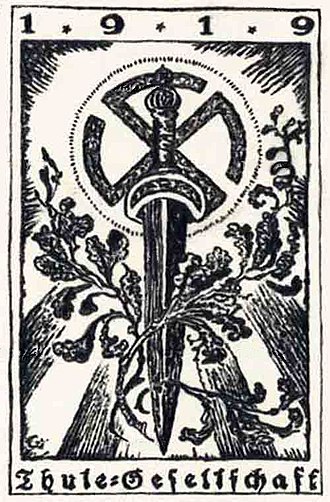
These are some facts and curiosities about the Thule society:
It was founded in 1910 by Felix Niedner, a philologist and historian from the University of Berlin.
It was immediately characterized by heated nationalism and intense anti-Semitism.
It was transferred to Munich on 18 August 1918, on the initiative of Rudolf Glauer.
According to the historian Peter Levenda, the Thuile was a ''mystical society inspired by the theosophical writings of Guido von List and Lanz von Liebenfels, that is, a mixture of oriental religions, theosophy, anti-Semitism, tales of the Grail, runic mystification and Nordic paganism.
On November 7, 1918, Kurt Eisner, a Jewish intellectual and supporter of the League of Nations, proclaimed the birth of a Socialist Republic in Munich, arousing the ire of German nationalists. On November 9, von Sebottendorff gave a passionate speech before the Thule, inciting the members to resist the Red Army, and he became the leader of the Munich Thule.
In February 1919 Eisner was assassinated in an isolated action by a former member of the Thule Society, Anton Graf von Arco auf Valley, who was excluded due to his partial Jewish origins.
The Thule Lodge risked disappearing during the socialist uprising of 1918-1919, when some of its most influential members, including Prince Thurn und Taxis, were murdered on the orders of the Jewish People's Commissars.
The ideological legacy of the Thule society was taken up by the National Socialist German Workers' Party.
Its press organ was the Münchener Beobachter which would change its name to Völkischer Beobachter, the official press organ of the Nazi Party.
Important Members
Karl Harrer: one of the founding members of the DAP, which later changed its name to NSDAP, better known as the Nazi Party.
Dietrich Eckart: who was defined by Hitler as ''the paternal friend''. He is defined as a martyr by Hitler himself in Mein Kampf.
Anton Drexler: first president of the NSDAP.
Rudolf Hess: He was appointed Reichsleiter and considered ''Hitler's dolphin''.
Alfred Rosenberg: considered with Hitler himself the ideologue of the Nazi Party
Hans Frank: future governor of Poland
Gottfried Feder: one of the ideological fathers of Nazism.
Wilhelm Frick: in 1943 he became Reichsprotektor of Bohemia and Moravia
Sources:
Wikipedia: The Thule Society.
If you don't like it go with your life.
❗❗I DON'T SUPPORT NAZISM, FASCISM AND ZIONISM, THIS IS AN EDUCATIONAL POST ❗❗
42 notes
·
View notes
Photo
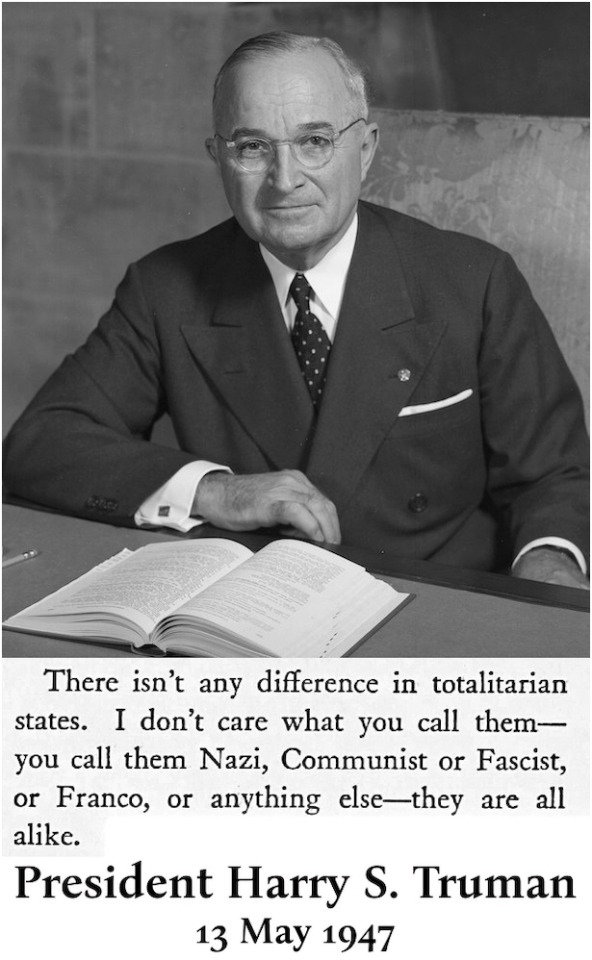
A few people are still making excuses for Russia on the basis that it is the supposed successor to the “workers’ paradise” known as the Union of Soviet Socialist Republics.
The USSR was a repressive police state which tolerated no dissent and invaded its neighbors — and that was even after the alleged de-Stalinization.
Many critics justly decry US transgressions like involvement in Vietnam, the Iraq War, and interference in Latin America for much of the last century. But when those same people ignore the Holodomor, Soviet cooperation with Nazi Germany over the invasion of Poland, and Putin’s ongoing mafia-style kleptocratic revanchist régime, there is more than a little hypocrisy involved.
President Truman was correct. Totalitarian autocracies are more similar than they are different. And using an ideological fig leaf to cover up the atrocities of such a régime is being deceitful.
The true geopolitical struggle is between democracy and totalitarianism. There may be some ways in which democracy is not perfect, but there is no way that totalitarianism is good for anybody except autocrats, kleptocrats, and dogmatic thugs.
#harry truman#totalitarianism#fascism#communism#nazism#putinism#revanchism#russia#tankies#invasion of ukraine#vladimir putin#autocracy#kleptocrats#soviet union#ussr#democracy vs. totalitarianism#liberal democracy#владимир путин#путин хуйло#долой путина#бывший ссср#россия#тоталитаризм#коммунизм#фашизм#путинизм#геть з україни#союз постсоветских клептократических ватников#гаррі трумен#україна переможе
73 notes
·
View notes
Text
THIS DAY IN GAY HISTORY
based on: The White Crane Institute's 'Gay Wisdom', Gay Birthdays, Gay For Today, Famous GLBT, glbt-Gay Encylopedia, Today in Gay History, Wikipedia, and more … January 18


1726 – Frederick Heinrich Louis, more commonly known as Prince Henry of Prussia was born in Berlin (d.1802). He also served as a general and statesman, and, in 1786, was suggested as a candidate for a monarch for the United States, but before he could make up his mind on the offer, the U.S. had opted to be a Republic.
The younger brother of King Frederick II of Prussia, Henry's conflicts with "Frederick the Great" are almost legendary.
In 1752 Henry married Princess Wilhelmina of Hesse-Kassel in Charlottenburg, but they had no children. Henry lived in Rheinsberg after receiving it as a gift from his brother. Despite the marriage, he scarcely concealed his passion for other men and developed intimate friendships with the actor Blainville and the French emigre Count La Roche-Aymon. One favourite, Major Kaphengst, exploited the prince's interest in him to lead a dissipated, wasteful life on an estate not far from Rheinsberg.
Henry successfully led Prussian armies as a general during the Seven Years' War (1756-1763), in which he never lost a battle. After the Prussian Army's initial success against one wing of the joint Russian and Austrian Armies in the Battle of Kunersdorf, Henry urged his brother Frederick to stop attacking. The king, who had already sent a message of victory to Berlin, pressed the attack. The day ended with a virtually destroyed Prussian army, a virtually defenseless Kingdom of Prussia, and a complete victory by the Russo-Austrian force. Afterwards, Henry reorganized the routed Prussian forces. Frederick came to rely on his brother as commander of the Prussian forces in the east, Frederick's strategic flank. Henry later won his most famous victory at Freiberg in 1762.
After the Seven Years' War, Henry worked as a shrewd diplomat who helped plan the First Partition of Poland through trips to Stockholm and St. Petersburg. In the 1780s he made two diplomatic trips to France. He was a friend of Jean-Louis Favier.
Henry attempted to secure a principality for himself and twice tried to become King of Poland, but was opposed by a displeased Frederick. The king frustrated Henry's attempt to become ruler of a kingdom Catherine II of Russia planned to create in Wallachia.
In 1786 either Nathaniel Gorham, then President of the Continental Congress, or Friedrich Wilhelm von Steuben, the Prussian general who served in the Continental Army, suggested to Alexander Hamilton that Henry should become President or King of the United States, but the offer was revoked before the prince could make a reply.


1867 – Félix Rubén García Sarmiento (d.1916), known as Rubén Darío, was a Nicaraguan poet who initiated the Spanish-American literary movement known as modernismo (modernism) that flourished at the end of the 19th century. Darío has had a great and lasting influence on 20th-century Spanish literature and journalism. He has been praised as the "Prince of Castilian Letters" and undisputed father of the modernismo literary movement.In November, 2012, the University of Arizona acquired a privately-held collection of manuscripts and letters created by Dario. This distinctive collection of archival material contained documents pertaining to Darío's life and work as a poet, journalist and diplomat. Several of the manuscripts are signed transcripts, written in Darío's hand, of some of his most important works including "Coloquio de los Centauros," two versions of "Los motivos del lobo" and "Canto épico a las glorias de Chile," a manuscript of 76 pages, which was one of Darío's first long poems.
The documents have already begun to alter the scholarship on Darío. The peer-reviewed "Bulletin of Spanish Studies," a prestigious academic journal from the United Kingdom, has published an article by Professor Alberto Acereda in its August 2012 issue based on letters found in ASU's collection. The article, "'Nuestro más profundo y sublime secreto': Los amores transgresores entre Rubén Darío y Amado Nervo," ("Our Most Profound and Sublime Secret: the Transgressive Love of Ruben Dario and Amado Nervo") reveals for the first time a secret romantic relationship between Darío and famed Mexican poet Amado Nervo (1870-1919) the Mexican Ambassador to Argentina and Uruguay, journalist, poet, and educator. Acereda said,"The exact nature of this relationship is evidenced in a series of intimate letters exchanged between the two poets and they help us to better understand the respective works of these modernist authors, as well as to establish a re-reading of certain texts."


1904 – Cary Grant, born Archibald Alexander Leach, (d.1986), was an English actor who later took U.S. citizenship. Known for his transatlantic accent, debonair demeanor and "dashing good looks", Grant is considered one of classic Hollywood's definitive leading men. His good looks, charisma, and ambiguous sexuality enchanted women and men alike. As the star-struck comedian Steve Lawrence once said, "When Cary Grant walked into a room, not only did the women primp, the men straightened their ties."
Born Archibald Alexander Leach on January 18, 1904, near Bristol, England, Grant began his career in vaudeville. In 1932 he signed with Paramount and moved to Hollywood, where he developed the debonair persona that made him famous. After appearing in half a dozen films, his big break came when the sultry Mae West handpicked him to star with her in She Done Him Wrong (1933). Based on West's Broadway hit Diamond Lil, the film made Grant a bankable star.
Grant's best-known films include The Awful Truth (1937), Bringing Up Baby (1938), Gunga Din (1939), The Philadelphia Story (1940), His Girl Friday (1940), Arsenic and Old Lace (1944), Notorious (1946), To Catch A Thief (1955), An Affair to Remember (1957), North by Northwest (1959) and Charade (1963).
Grant was married five times. But there were well-founded rumours that he was bisexual or gay. Homosexual screenwriter Arthur Laurents wrote that Grant "told me he threw pebbles at my window one night but was luckless". Grant allegedly was involved with costume designer Orry-Kelly when he first moved to Manhattan, and lived with Randolph Scott off and on for twelve years.
Richard Blackwell wrote that Grant and Scott were "deeply, madly in love", and alleged eyewitness accounts of their physical affection have been published. Alexander D'Arcy, who appeared with Grant in The Awful Truth, said he knew that Grant and Scott "lived together as a gay couple", adding: "I think Cary knew that people were saying things about him. I don't think he tried to hide it." The two men frequently accompanied each other to parties and premieres and were unconcerned when photographs of them cozily preparing dinner together at home were published in fan magazines. Biographer Roy Moseley claims that Grant and Scott were seen kissing in a public carpark outside a social function both attended in the 1960s. William J. Mann's book Behind the Screen: How Gays and Lesbians Shaped Hollywood, 1910-1969 recounts how photographer Jerome Zerbe spent "three Gay months" in the movie colony taking many photographs of Grant and Scott, "attesting to their involvement in the Gay scene." Zerbe says that he often stayed with the two actors, "finding them both warm, charming, and happy."

Cary Grant (R) with Randolph Scott
For more pictures and backround of this 1930s 'bromance' see Cary Grant and Randolph Scott: A Love Story.
Barbara Harris, Grant's widow, has disputed that there was a relationship with Scott. When Chevy Chase joked about Grant being gay in a television interview Grant sued him for slander; they settled out of court. However, Grant did admit in an interview that his first two wives had accused him of being homosexual. Betsy Drake commented: "Why would I believe that Cary was homosexual when we were busy fucking? He lived 43 years before he met me. I don't know what he did. Maybe he was bisexual."
Although most of his career was spent playing a static archetype, Grant was unafraid to take risks, professionally or privately. He is credited with using the word "gay" for the first time in a homosexual context on screen. In Bringing Up Baby (1938), Grant plays a shy paleontologist against Katharine Hepburn's spoiled New York heiress. During one scene, Grant appears in a frilly pink dressing gown and to incredulous observers delivers his famous line "because I just went gay all of a sudden."
Knowing his audience did not want to see him age, Grant retired from films in the 1960s, secure as one of Hollywood's brightest stars. He died on November 29, 1986.


1913 – Danny Kaye, born David Daniel Kaminsky, (d.1987) was a celebrated American actor, singer, dancer, and comedian. His best known performances featured physical comedy, idiosyncratic pantomimes, and rapid-fire nonsense songs.
Kaye starred in 17 movies, notably The Kid from Brooklyn (1946), The Secret Life of Walter Mitty (1947), The Inspector General (1949), Hans Christian Andersen (1952), and — perhaps his most accomplished performance — The Court Jester (1956). His films were extremely popular, especially his bravura performances of patter songs and children's favorites such as The Inch Worm and The Ugly Duckling. He was the first ambassador-at-large of UNICEF and received the French Legion of Honor in 1986 for his many years of work with the organization.
Kaye and his wife, Sylvia Fine, both grew up in Brooklyn, living only a few blocks apart, but they did not meet until they were both working on an off-Broadway show in 1939. They were married on January 3, 1940.
During World War II, the Federal Bureau of Investigation investigated rumors that Kaye dodged the draft by manufacturing a medical condition to gain 4-F status and exemption from military service. FBI files show he was also under investigation for supposed links with Communist groups. The allegations were never substantiated, and he was never charged with any associated crime.
After Kaye and his wife became estranged, he was allegedly involved with a succession of women, though he and Fine never divorced. The best-known of these women was actress Eve Arden.
There are persistent rumors that Kaye was either homosexual or bisexual, and some sources claim that Kaye and Laurence Olivier had a ten-year relationship in the 1950s while Olivier was still married to Vivien Leigh. A biography of Leigh states that the alleged relationship caused her to have a breakdown. The alleged relationship has been denied by Olivier's official biographer, Terry Coleman. Joan Plowright, Olivier's widow, has dealt with the matter in different ways on different occasions: she deflected the question (but alluded to Olivier's "demons") in a BBC interview. However, in her memoirs Plowright denies that there had been an affair between the two men. Producer Perry Lafferty reported: "People would ask me, 'Is he gay? Is he gay?' I never saw anything to substantiate that in all the time I was with him." Kaye's final girlfriend, Marlene Sorosky, reported that he told her, "I've never had a homosexual experience in my life. I've never had any kind of gay relationship. I've had opportunities, but I never did anything about them."

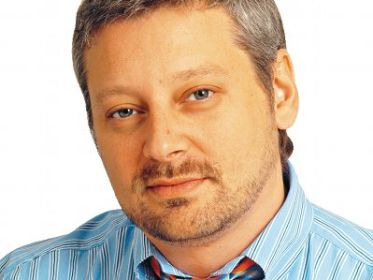
1973 – The Chilean journalist Juan Manuel Astorga was born today. Astorga is a major media personality having hosted radio, television and cable shows in his long and storied career. In 2008, Astorga gave an interview to Caras magazine, in which he discussed his homosexuality .
He chose to disclose his sexuality before he was outed by an attorney who was a member of the Fascist-connected Catholic order Opus Dei. The attorney attempted to extort money from Astorga by threatening to out him. Astorga beat him to the punch. The Movement for Homosexual Integration and Liberation of Chile supported Astorga and condemned this kind of blackmail.


1986 – Eugene Lee Yang is an American filmmaker, actor, and internet celebrity, best known for his work with BuzzFeed (2013–2018) and The Try Guys (2014–present). Yang is also known for his work with various human rights and LGBT advocacy charities such as The Trevor Project.
Yang, the only son of Korean immigrants Min-Young and Jae Yang, was born and raised in Pflugerville, Texas. He is the middle child of two sisters. Growing up in Pflugerville, Yang's family was one of the few Asian Americans in their community. He struggled with body image issues and low self-esteem as, in his own words, no one looked like him, and suffered bullying due to his appearance.
At school, he engaged in artistic activities including visual arts, illustration, theater, choir, and dance. However, a seventh-grade teacher recommended that he should consider studying filmmaking. He later went to the University of Southern California and, during his studies, had written and directed six short films discussing wide-ranging social and political topics, including mental health care, gay marriage, and school shootings. He graduated with a B.A. in cinema production degree in 2008. On June 15, 2019, Yang came out as gay in a video titled "I'm Gay" which he wrote, directed, and choreographed with the song "A Moment Apart" by Odesza.
In 2013, he started working for the video branch of the internet media company, BuzzFeed, at the recommendation of a colleague who saw his potential in creating short format videos. He was given free control on experimental video productions and exploring new modes of storytelling.Reaction to some of his early works was positive particularly on their distinct candor and reliability, which led to more provocative sketches such as
The Try Guys, which was established in Buzzfeed in 2014, together with co-stars Ned Fulmer, Keith Habersberger, and Zach Kornfeld. The show is a mix of social commentary and humor depicting scenarios such as men going through labor pains and prostate cancer check at a doctor's office. The cast initially were hesitant about stepping out from behind the camera as they had limited acting experience, but they continued producing videos for the show after receiving positive feedback.
Yang is the only openly gay member among the cast of The Try Guys, which also produced LGBTQ-themed videos such as season 1 episode 3 The Try Guys Try Drag for the First Time. On October 31, 2018, he published the video, My Dad’s First Drag Show (Featuring Kim Chi), where he adopted a similar approach into exploring drag culture by inviting his father and stepmother to a drag show.
He also executively produced and hosted Buzzfeed's Queer Prom five-part video series that documented the journey of eight high school seniors who attended the company's first LGBTQ-themed prom together with other students.
On October 11, 2018, commemorated as the 30th year of National Coming Out Day, he took over the website of the advocacy group Human Rights Campaign, publicly sharing his experience growing up as a young queer man and advocating for LGBTQ representation in the media. Furthermore, he collaborated with The Trevor Project, a non-profit LGBTQ suicide prevention organization, to raise awareness on the incidence of suicide among LGBTQ youth and in inviting volunteers in the video Eugene Volunteers at the Trevor Project, which was posted on December 3, 2018.
He referred to himself as queer and LGBT, however, on June 15, 2019, Yang explicitly came out as gay in a music video. Two days later, Yang released an accompanying video documenting the creation of the video, his feelings, and his thoughts surrounding his coming out process.
In 2019, he announced that he is in a relationship with Matthew McLean

2009 – On this date the Right Reverend Gene Robinson, the bishop of New Hampshire, and the first openly gay bishop of any denomination opened the inaugural festivities of Barack Obama's presidency when he gave the opening prayer at the Lincoln Monument. HBO, which had paid for exclusive rights to the event did not broadcast Bishop Robinson's prayer. So those watching the event live or later in replay would never have known it had occurred.
Curiously, National Public Radio chose not to air the prayer live either. There was no record of Bishop Robinson or his prayer in images placed on the sites of Getty Images, the New York Times and the Washington Post.
Very curious indeed. After some lame excuses HBO later aired a complete version of the afternoon's proceedings with Bishop Robinson's prayer included. No good excuse was ever given by the inaugural committee.
On an added note the Gay Men's Chorus of Washington also performed at the event but there was no announcement or caption of any sort to identify the group performing (perhaps to not upset any viewers out there).

2010 – Undercover cops are working Dubai's chat rooms to bust gay men for trying to hookup online. The National reports that one 22 year old man is charged with prostitution, consensual homosexual sex, producing pornographic material, cross-dressing and insulting religion, while the second, an 18-year-old student, is facing prostitution charges. Homosexuality is illegal in the United Arab Emirates, and if found guilty both face a minimum of three and a maximum of 15 years in prison.


12 notes
·
View notes
Text

Happy birthday, Wilhelm Pieck! (January 3, 1876)
President of the German Democratic Republic from 1949 to 1960, Wilhelm Pieck was born into a Catholic family in what is now Poland. A carpenter by trade, Pieck's involvement with the carpenters' union led him to join the Social Democratic Party of Germany at age 19. Pieck was a leading voice in the party's left wing, and he was jailed for opposing German involvement in World War I, joining the new Communist Party of Germany after he was released. He narrowly escaped being murdered alongside Rosa Luxemburg and Karl Liebknecht and later fled Germany as the Nazis took power, settling for a time in Moscow. After World War II, Pieck returned to Germany and assumed leadership of the new socialist government of eastern Germany. He died in 1960.
94 notes
·
View notes
Text
EU ministers have urged member states to do more to screen migrants and expel those regarded as a security risk, amid rising concerns over militant attacks.
Interior and justice ministers were meeting days after a teacher in France and two Swedish nationals in Brussels were murdered by suspected Islamists.
Police across Europe are on high alert in the wake of the Israel-Hamas war.
In France, President Emmanuel Macron has attended the funeral of the teacher fatally stabbed at a school last week.
The service for Dominique Bernard, who was 57, took place in the northern city of Arras. Mr Macron met the family beforehand.
The literature teacher and father of three has been posthumously awarded the Legion of Honour, France's highest civilian decoration.
Dominique Bernard was among several staff who tried to tackle the attacker. Another teacher and a security guard were seriously wounded.
"He was sensitive and quiet. He did not like the sound and fury of the world," Bernard's wife Isabelle, who is also a teacher, told mourners.
The service was broadcast on a screen in Arras's Place des Héros (Heroes' Square).
The suspect, named as 20-year-old Mohamed Mogouchkov, is a Russian national of Chechen origin. He shouted "Allahu Akbar", or "God is greatest", during last Friday's attack, eyewitnesses said.
He has been arrested and faces murder and terror charges.
Mohamed Mogouchkov was known to security services. As a former pupil at the school, he had alarmed teachers with his extremist language, reports said.
Police have also arrested several members of his family, including a brother aged 17, his mother, a sister and an uncle.
As European Union ministers met in Luxembourg on Thursday, EU migration commissioner Ylva Johansson told reporters: "It's important that those individuals that could cause a security threat to our citizens be returned forcefully, immediately."
She added: "We need to be more efficient, close the loopholes and be quicker on decisions to carry out returns."
French Interior Minister Gérald Darmanin said there was "still a bit naivety either in the institutions of some countries, or in the EU".
Monday's attack in Brussels also highlighted problems with the EU's migration and asylum systems.
The Tunisian gunman, identified as Abdesalem Lassoued, shot dead two Swedish football fans on the evening of a Euro 2024 qualifier, before being killed by police the following morning.
Belgian authorities revealed on Thursday that the 45-year-old had tried and failed to get asylum in four European countries - Norway, Sweden, Italy and Belgium. Sweden's migration agency had earlier said he had served a prison sentence there between 2012 and 2014.
He had stayed in Belgium illegally after a bid for asylum was rejected in 2020.
A plan to make it mandatory for EU states to try to return people staying illegally has been stalled for years.
The war between Israel and Islamist militant group Hamas has led to fears of further violence from militants on the continent.
Italy is imposing controls on its border with Slovenia for 10 days because of concerns over national security and irregular migration. Slovenia will follow suit on its borders with Croatia and Hungary from Saturday.
Several other EU member states, including Austria, the Czech Republic and Poland, have already imposed checks in a bid to counter people-smuggling.
8 notes
·
View notes